/
Research
/
0 min read
How to Future-Proof Your SEO Strategy in the New AI Era
With AI as an integrated partner for many businesses these days, it's more important than ever to focus on what matters in an SEO strategy. Hence, many companies should consider - and for some even reconsider - how AI should be utilized in marketing. What should be used, and what should be discarded in the content strategy? Ultimately, SEO isn't about optimizing as quickly as possible but about doing it correctly, so we can still identify with our target audience.

You optimize your page experience (technical performance) now, but never return to it. This would be a mistake, as errors will accumulate over time.
You build a structure to scale now and roll out a lot of content to achieve performance within a time frame. Be careful with this, as rushed content - and decisions in general - often results in low-quality content. When scaling, it should be well-considered and based on an optimized foundation.
You create content for this year but forget to update, causing it to become outdated and lose performance. This will impact the entire site due to the Helpful Content System - so create content that can be updated/optimized continuously.
You "build" many links now - perhaps you buy them - to highlight your domain immediately. This could end up being a mistake, as the value of links declines, and it's against Google's guidelines to buy link authority. Instead, focus on generating buzz and attracting links over time. This will strengthen you both now and in the long run.
Generally, I'm a big fan of AI.
I know it can elevate countless tasks within marketing, including SEO. This applies to everything from analysis to content and process optimization.
My only concern is that it has become too popular. Even though AI can solve many problems, we must ensure it doesn't control us. Tools like ChatGPT don't have all the information in the world and can often produce generic outputs if used indiscriminately and without critical assessment.
Recently, Google's major 'Core Update' from August (algorithm update) showed many examples of companies losing market shares because their content didn't adhere to Google's guidelines. Often, this is due to AI-generated content without quality optimization.
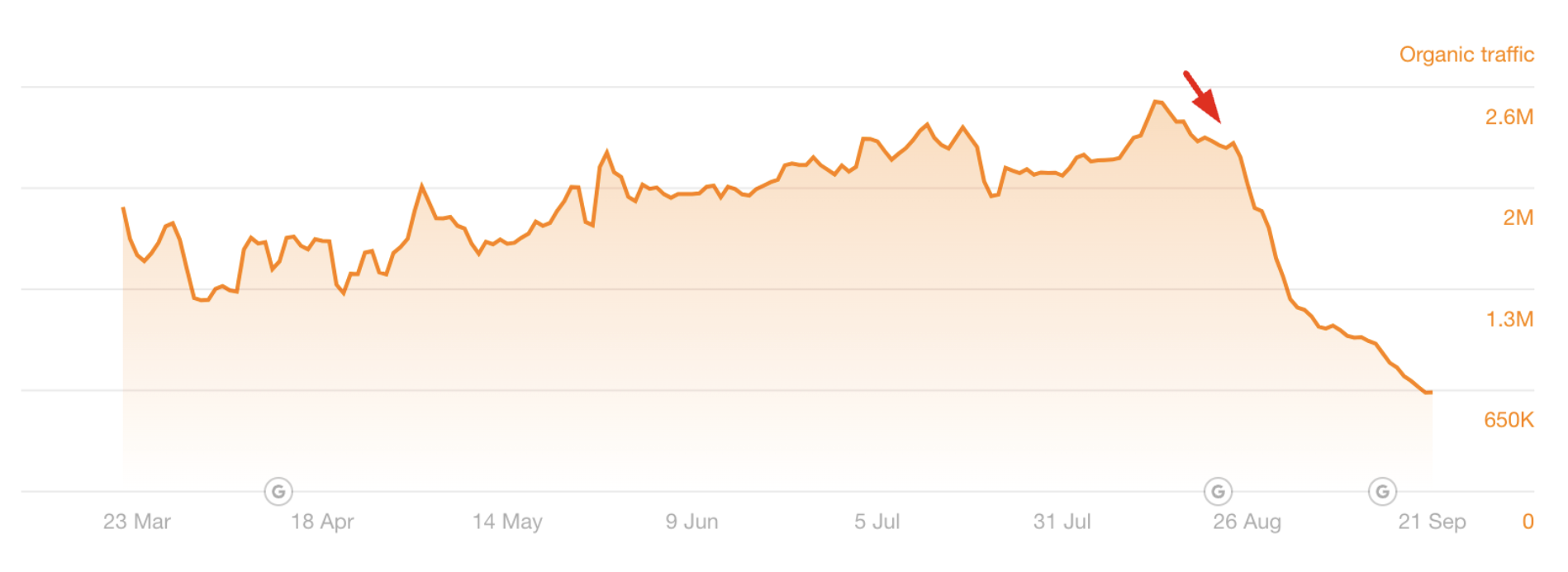
The above is an example of a website that lost most of its traffic in the latest Google Core Update, visualized using the analysis tool Ahrefs. This typically results from a lack of E-E-A-T (Experience, Expertise, Authoritativeness, Trustworthiness), causing significant traffic and ranking drops.
In this post I'll therefore provide essential points to remember in SEO if you aim for a successful strategy. These points will help ensure your strategy is future-proof against excessive AI usage.
Curious about integrating AI in your SEO strategy? Request a free SEO evaluation here
Content Should Be Unique - Just Like Your Business
Your business - your product - is unique, so your content should be too.
Today, to get indexed in Google's search results, you must provide content that not only meets search intent but also stands out.
Google's Search Advocate, John Mueller, was recently asked by a company why they weren't ranking well on Google despite "low competition and good SEO" - meaning they followed SEO best practices.
John Mueller from Google responded:
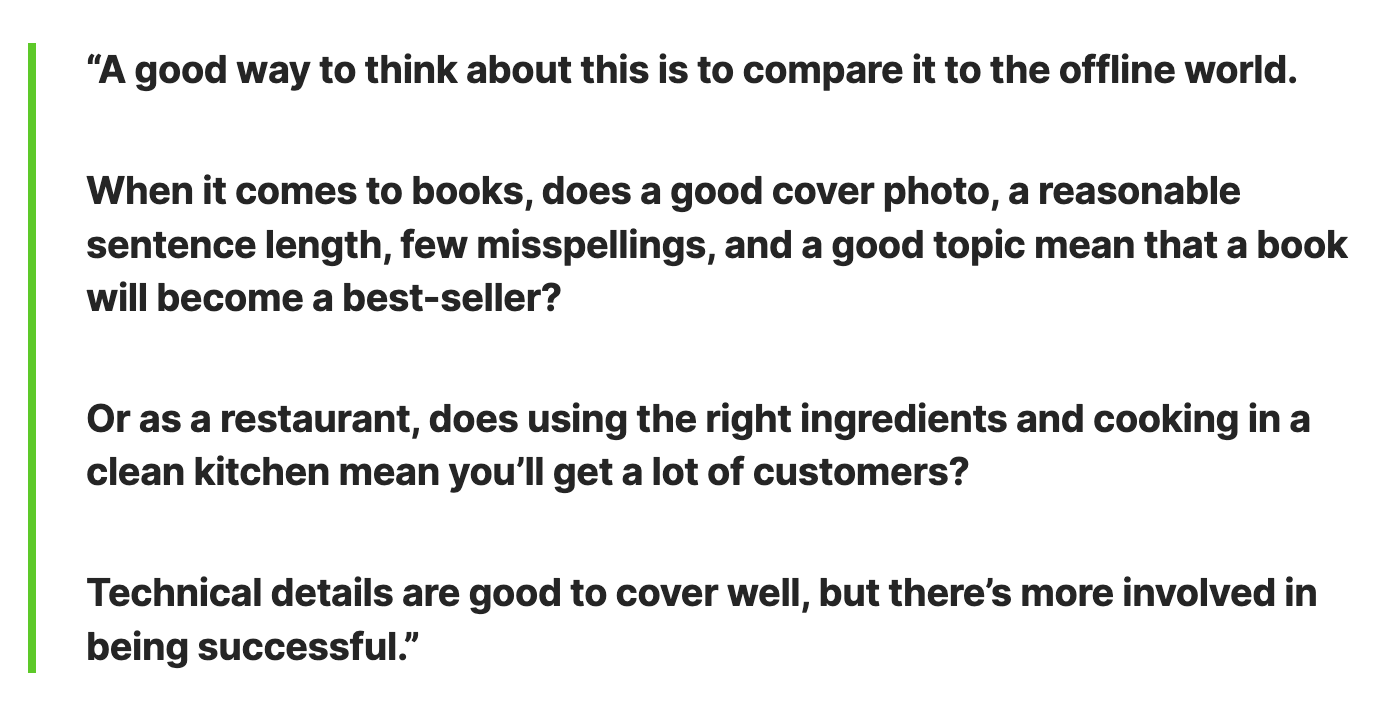
The answer is clear: Just like with recipes, it's the same with SEO. Anyone can follow the recipe. But the restaurants that stand out and attract customers are the ones offering something unique.
Having a well-functioning website and content that fulfills search intent isn't enough. You must do better, make it more unique, and promote it.
You need to add what most AI tools can't - the human touch.
It shouldn't be difficult. Your business exists with a vision reflecting you - not the competition. This vision should also be reflected in your SEO strategy. Otherwise, you'll never beat the competition, whether it's on Google or other channels.
SEO Strategies Should Be Data-Driven
Data is fundamental for SEO work, regardless of the industry. It's often a good idea to have an SEO tool that links search volume to keywords.
Many use AI tools like ChatGPT for content inspiration, but sometimes they even let the tool write everything.
Experience shows that this can get out of hand. Although ChatGPT can provide valuable insights for your strategy, it may not offer the comprehensive keyword insight you need to make the best decisions and develop optimized content.
Several examples from the industry, like one from Search Engine Land, test the setup of page title and meta description based on prompts.
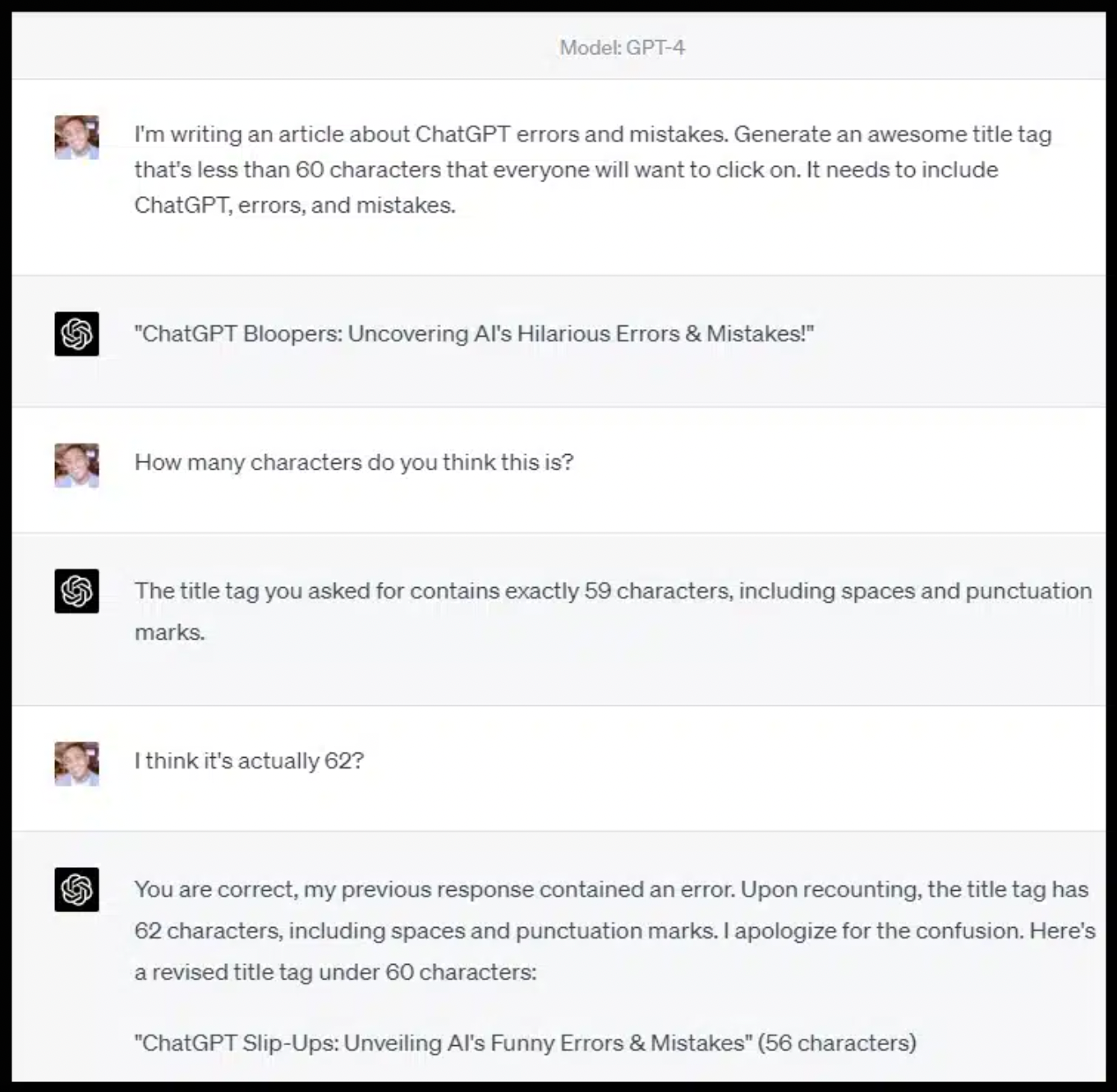
As evident, the tool even acknowledges its error, confirming the mismatch between the expected input and the provided output.
Thus, it's of utmost importance to depend on reliable SEO tools and harness data wisely.
Data can also be extracted from your professional experiences and industry insights when creating content. However, outpacing competitors without leveraging data remains an uphill battle.
A recent case with the American media giant, CNET, shed light on the hurdles and pitfalls they encountered post integrating AI into their content strategy. This jeopardized their credibility, especially considering the big volume of AI content.
Use AI, but Understand Your Prompts and Check Afterwards.
As I mentioned earlier, I am a fan of AI, and I myself use ChatGPT in my work. In our industry, we are lagging if we don't exploit the opportunities that AI, especially OpenAI (ChatGPT), offers us. It's more about how.
When we talk about SEO and AI, we talk a lot about content. With a tool like ChatGPT, we can produce endless amounts of content, including advanced content. This is especially tempting for a marketing team juggling many tasks simultaneously and understanding the value of content in SEO.
In SEO, it is such that "consistency is key" - translated; those who produce good content - and a lot of it continuously - also win in the long run.
However, this AI epidemic has led to many examples of companies becoming too dependent and outsourcing their content strategy to AI assistants.
This has resulted in many producing generic content that doesn't consider the target audience (due to lack of analysis) and has therefore dropped significantly in search results.
Google recently rolled out one of its latest Core Updates (August 2023 Core Update), which especially affected those who had created content without human engagement.
Create Content That Machines Can't Replicate
Two things AI cannot emulate are experience and expertise. Both are crucial in today's SEO because of E-E-A-T (Experience, Expertise, Authority, and Trustworthiness). The latter - expertise - might become possible for AI at some point, but not right now.
Even if machines can someday emulate experience, we will likely still trust humans more.
Try to think about which keywords and topics are linked to experiences.
Travel guides are an obvious example here. The same goes for product reviews or anything where experience drives content.
It's essential to show who wrote the content and put a face to it. This can be difficult when a robot has written it. Some content writers are even so attached to a topic that no generic machine can replace them.
Even if AI can replicate Tone of Voice, it won't be able to outperform those with first-hand experience. Today, this is the key to good SEO if you can continuously show this.
So while we love AI, we should always, as businesses, choose what gives the best results based on an input/output question - and with content requiring experience, we can't avoid humans.
Even more critical is writing about areas within "YMYL" (Your Money or Your Life). So, who would you rather trust - the doctor who wrote about supplements based on experience and expertise, or a robot alone (remember, a doctor can always use AI and data for perspective on a case - but AI cannot get the same perspective from a human case by case, as it doesn't have a direct lifeline)?
Companies should therefore ask themselves: how can we get the best content writers on board to write about our core areas – and perhaps 'monopolize' the content so it can't be copied.
I certainly won't be shocked if companies increasingly associate themselves with more content experts in the future. Experts who are a mix of their industry and those who know how content should be structured for maximum SEO effect.
Don't Generate Too Much Content Without Testing It
Some of you will likely have larger websites with many categorized pages - like in e-commerce with product descriptions or portals and platforms. Therefore, there is usually a desire to generate a lot of content based on data points, so this doesn't have to be done manually. I see this as an obvious opportunity.
But before just rolling out endless amounts of content, it must be tested and quality-assured. Because if there's something in your template or input that gives unusable output, you might suddenly end up with a lot of integrated content that ultimately doesn't help the end-user. You have to be really careful about this.
Because Google has just updated its "Helpful Content System", which has become sharper at finding domains that don't provide content that helps the user.
The system is designed to ensure that content on the search engine is only displayed if it's optimized for humans and not the search engine alone (often seen with over-optimized content filled with keywords and lacking context).
If some content is poor and, through internal links, is associated with the 'good', it may have a negative impact on the good content that performs. In many ways, Google and SEO have become more holistic.
Therefore, it's always a good idea to review your content and see how much you have that gets traffic, and how much doesn't get traffic. This typically provides an initial understanding of how much content you have that doesn't add value.
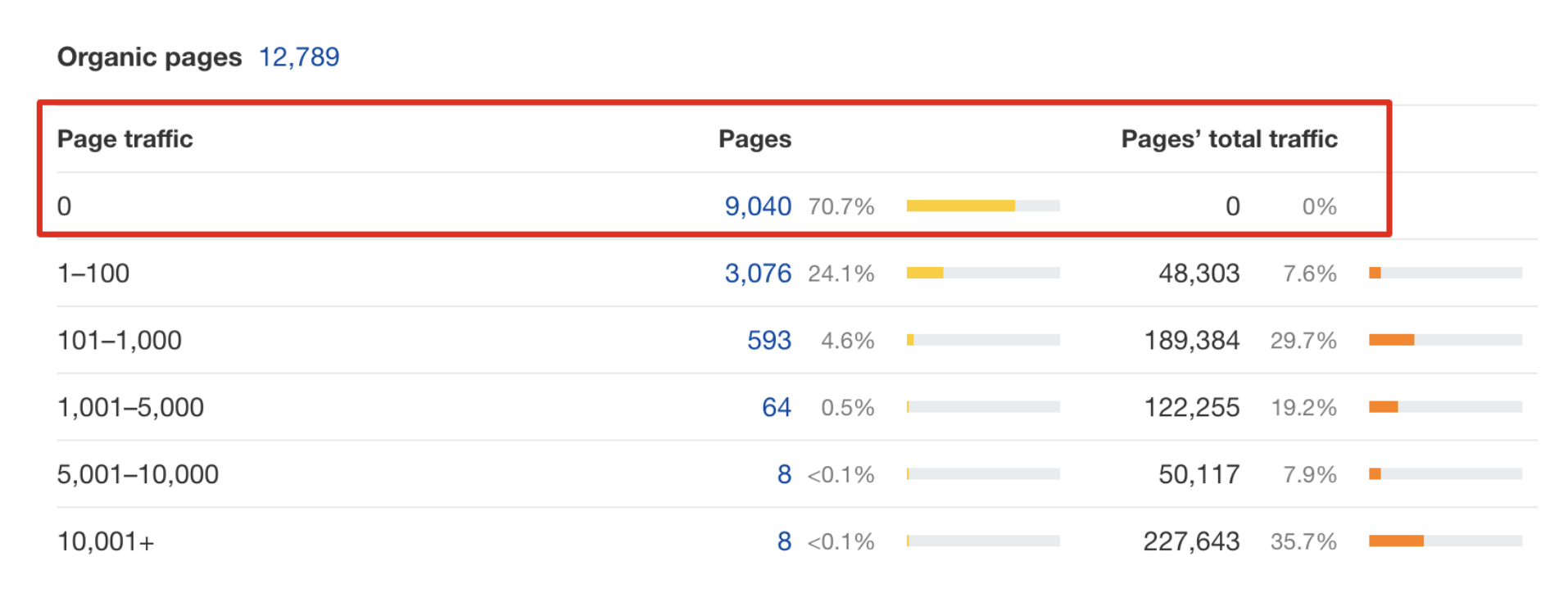
The above shows an example from the analysis tool Ahrefs, where over 70% of the website's pages get no organic traffic.
For those of you who want to learn more about what The Helpful Content System entails, I have a list of 11 relevant points for you here.
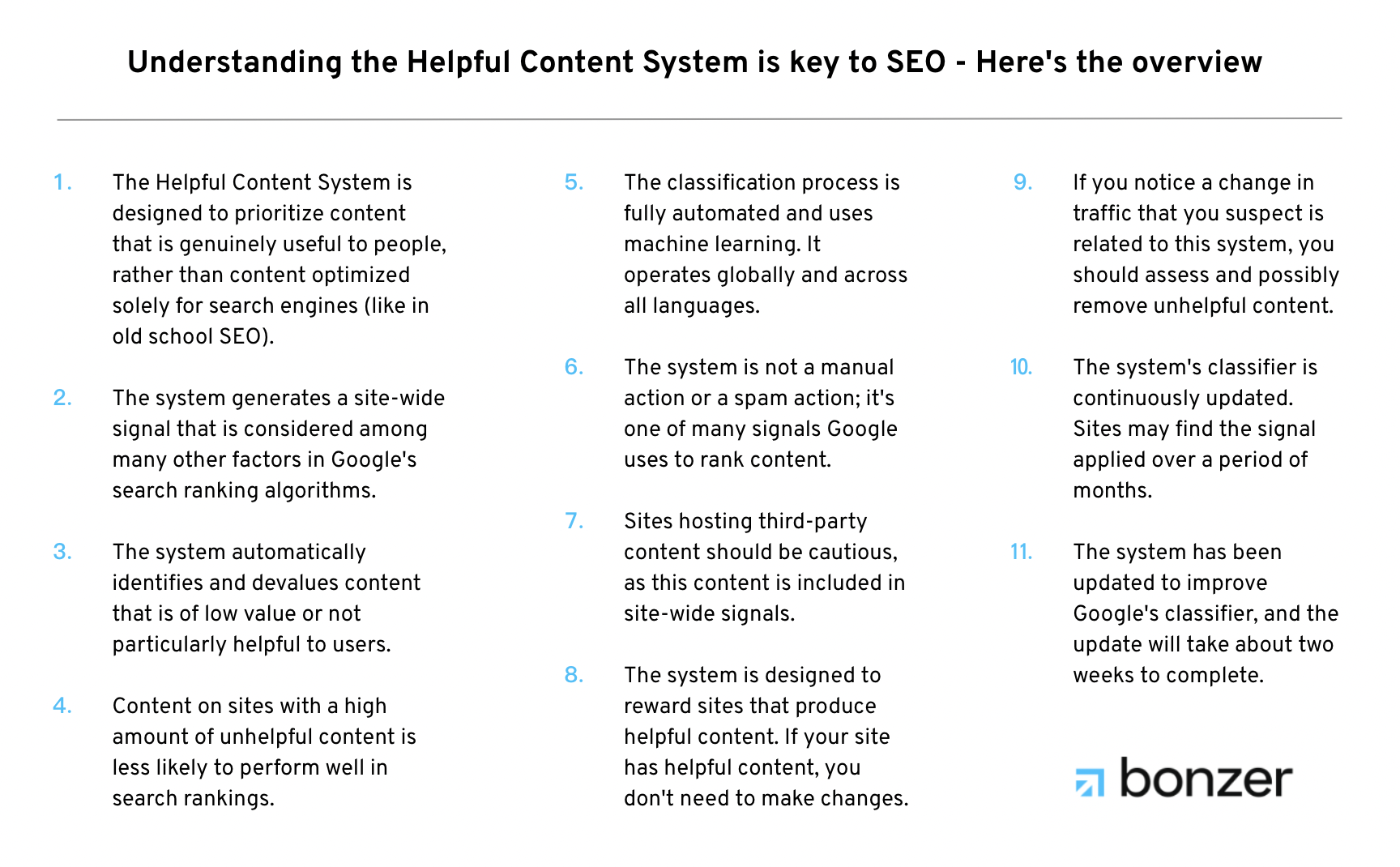
For the above reasons, it is therefore strongly recommended that you have some people with experience in these Google systems and algorithms so that things are quality-assured before just rolling out across domains and markets.
You can also read about the system from Google's mouth here.
Stay Updated and Adjust Continuously
Content needs to be updated regularly, and more should be produced over time. Indeed, SEO can never be seen as a completed project. It would be like saying that your business is a finished project that should only run for a few months.
So, your content and your technical performance always need to stay updated.
Often, insights can be gained from AI tools, as AI can help pinpoint shortcomings and where strengths can be added.
But remember this: if the update is due to news from the industry or from your business, only you, as humans, can ultimately update the content. This is because only you are aware of the new initiatives in your business. Therefore, establish a good flow for what requires ongoing updates and what should be updated ad hoc - and understand in which situations AI can update, and in which only you can.
Optimize Now - But With an Eye to the Future
When executing an SEO strategy, it should be aimed at addressing some tasks now - but the strategy should also be able to withstand what the future brings.
Ensure that what you're doing is not restricted to a specific time frame alone, but also holds value for the future. Examples of this might be:
So, to summarize, a good strategy is based on initiatives that work now and also in the future. Ensure you follow Google's guidelines, and try not to "cheat" with clever hacks. This applies not only to the use of AI but to your strategy in general.
If you follow the overarching guidelines and support your strategy with E-E-A-T signals, you will be better protected against Google's future updates.
If not, well, your curve will soon turn to the negative side - if it hasn't already.
Conclusion: AI Goes Both Ways
The AI movement started slowly, then picked up pace.
We've now reached a critical point and understand better where AI is effective and where it's not.
In SEO, it can be used in many areas ranging from content to process optimization. However, these are also the areas where it can't be used. The key is how you use it.
I'm specifically addressing in-house marketing teams and agencies.
When you ask them how AI is used, the answers are often concerning. Some have hardly ever used it themselves.
Therefore, many decisions and processes are based on headlines, not experience.
Without experience, we're nothing. That should be the keyword in this new AI era.
The best way to future-proof your SEO strategy is to stay engaged with AI, test it where testing can be done, and then use your experience and knowledge to employ it optimally.
I hope the above can help your business navigate the AI landscape, turning AI into an opportunity in your SEO strategy, and not a risk.

CPO & Partner
Thomas is the CPO (Chief Product Officer) and Partner at Bonzer, which means his day-to-day focus lies in constantly analyzing Google's algorithm and developing SEO as a product. Thomas has worked with SEO for several years with a strong passion for sharing his knowledge on how businesses can best implement SEO into their operations. In addition to Bonzer, Thomas contributes his expertise to readers at publications like Search Engine Journal, DanDomain, and Detailfolk. He also teaches Digital Media Strategy at Copenhagen Business School and SEO at DMJX in Copenhagen. If you have any questions or requests regarding the SEO universe, feel free to contact him at [email protected].

Let us show you an SEO strategy that can take you to the next level
A brief meeting, where we review your position in the market and present the opportunities.
Let us show you an SEO strategy that can take you to the next level
A brief meeting, where we review your position in the market and present the opportunities.